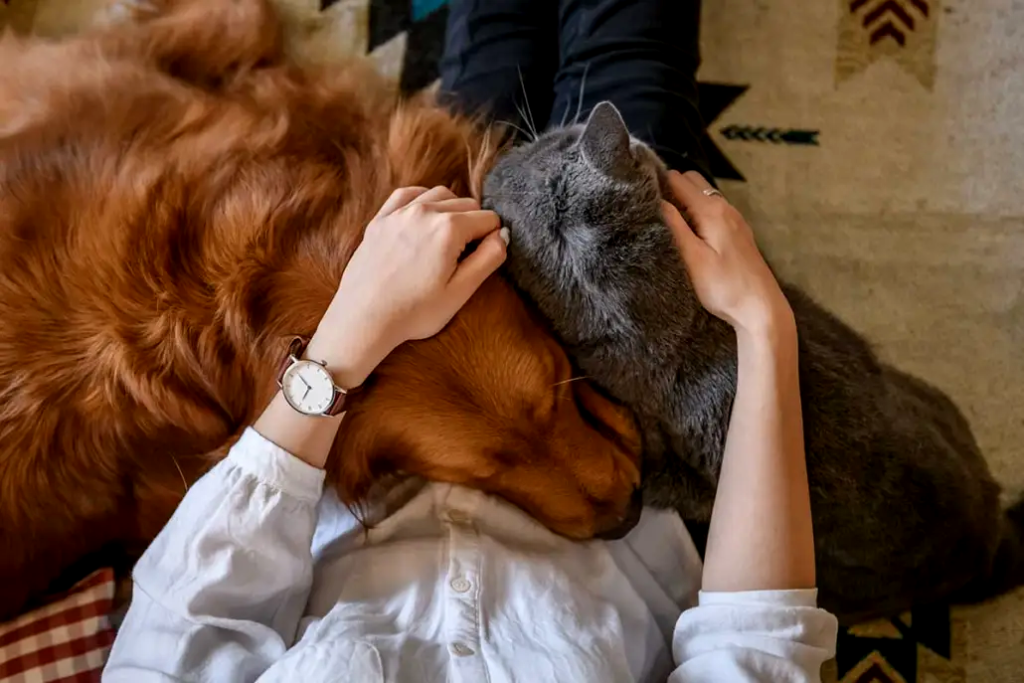
Pet Mental Health Matters: Promoting Wellbeing in Your Pets
Pets play a significant role in our lives, bringing us joy, companionship, and unconditional love. Just like humans, pets can experience mental health challenges that affect their overall well-being. As responsible pet owners, it is our duty to promote and prioritize the mental health of our furry friends. In this article, we will explore the importance of pet mental health and provide actionable tips to enhance the well-being of your beloved pets.
Read More: The Benefits of Pet Ownership: Improving Health and Well-Being
Understanding Pet Mental Health

Pets, just like humans, can experience a range of emotions and behavioral patterns that reflect their mental state. While they may not be able to communicate their feelings verbally, it is essential to understand the signs and symptoms of mental distress in pets.
Signs of Mental Distress in Pets
- Changes in appetite or weight loss
- Excessive grooming or self-mutilation
- Aggression toward humans or other animals
- Excessive barking, meowing, or howling
- Lethargy or withdrawal from social interactions
- Destructive behavior, such as chewing furniture or household items
Creating a Safe and Stimulating Environment
A pet’s environment plays a crucial role in their mental well-being. Here are some tips to create a safe and stimulating environment for your pets:
- Provide a comfortable and cozy sleeping area.
- Ensure access to fresh water and a balanced diet.
- Create designated play and exercise areas.
- Use pet-friendly and non-toxic cleaning products.
- Minimize exposure to loud noises or stressful situations.
Regular Exercise and Physical Stimulation
Exercise is vital for maintaining both physical and mental health in pets. Regular physical activity helps in releasing endorphins, reducing stress levels, and preventing behavioral issues. Engage in activities such as daily walks, interactive play sessions, or puzzle toys to keep your pets mentally stimulated and physically fit.
Socialization and Bonding
Socialization plays a significant role in the mental well-being of pets, particularly during their formative years. Introduce your pets to new environments, people, and other animals to foster positive social interactions. Arrange playdates, enroll in obedience classes, or visit pet-friendly parks to promote socialization and strengthen the bond between you and your furry companion.
Proper Nutrition for Mental Wellbeing
A well-balanced diet is essential for the overall health and mental well-being of pets. Provide a nutritionally balanced diet suitable for your pet’s age, breed, and specific needs. Consult with a veterinarian to ensure that your pet’s diet includes essential nutrients, vitamins, and minerals necessary for their mental health.
Mental Stimulation and Enrichment Activities
Mental stimulation is crucial for preventing boredom and maintaining optimal mental health in pets. Incorporate enrichment activities such as puzzle toys, treat-dispensing toys, or interactive games that challenge your pet’s cognitive abilities. These activities provide mental stimulation, prevent destructive behavior, and promote a healthy and happy mindset.
The Power of Positive Reinforcement
Positive reinforcement is a highly effective training method that encourages desired behaviors in pets. Reward your pets with treats, praise, and affection when they display good behavior. This approach helps build a strong bond, boosts their confidence, and enhances their overall mental well-being.
Calming Techniques for Anxious Pets

Anxiety is a common mental health issue among pets, and it is essential to help them cope with stressful situations. Implement calming techniques such as using pheromone diffusers, providing safe spaces or hiding spots, and playing soothing music to create a relaxing environment for anxious pets.
Recognizing and Addressing Separation Anxiety
Separation anxiety can lead to severe distress in pets when left alone. Gradually acclimate your pets to being alone by practicing short periods of separation and gradually increasing the duration. Provide comforting toys or leave a piece of clothing with your scent to alleviate their anxiety.
Seeking Professional Help: Veterinarians and Animal Behaviorists
If you notice persistent signs of mental distress in your pet or if their behavior becomes concerning, seek professional help. Veterinarians and animal behaviorists can provide expert guidance, diagnose underlying issues, and recommend appropriate interventions or treatments for your pet’s mental well-being.
The Role of Routine and Structure
Pets thrive on routine and structure. Establish a consistent schedule for feeding, exercise, playtime, and rest. Predictability and a structured environment create a sense of security for your pets, reducing stress and promoting mental stability.
Monitoring and Managing Stress in Pets
Stress can significantly impact a pet’s mental health. Be mindful of stressful triggers and try to minimize their exposure to them. Additionally, provide stress-relieving outlets such as interactive toys, calming supplements, or aromatherapy to help your pets relax and unwind.
Importance of Grooming and Hygiene
Regular grooming and hygiene practices are not only essential for your pet’s physical health but also contribute to their mental well-being. Brushing their coat, cleaning their ears, and maintaining oral hygiene prevents discomfort, reduces the risk of infections, and enhances their overall mental state.
Promoting Mental Health in Aging Pets
As pets age, they may experience cognitive decline or other age-related mental health issues. Provide them with extra care, patience, and support during this stage of their lives. Enrich their environment with memory-enhancing toys, maintain a consistent routine, and consult with a veterinarian for appropriate interventions to promote their mental well-being.
FAQs (Frequently Asked Questions)
1. Can pets really experience mental health issues? Yes, pets can experience a range of mental health issues, including anxiety, depression, and cognitive decline.
2. How can I tell if my pet is experiencing mental distress? Signs of mental distress in pets may include changes in appetite, excessive grooming, aggression, lethargy, or destructive behavior.
3. What can I do to promote mental well-being in my pets? You can promote mental well-being in your pets by creating a safe environment, providing regular exercise and mental stimulation, socializing them, and ensuring proper nutrition.
4. When should I seek professional help for my pet’s mental health? If you notice persistent signs of mental distress or concerning behavior in your pet, it is advisable to seek professional help from a veterinarian or animal behaviorist.
5. How can I help my aging pet maintain good mental health? To promote mental health in aging pets, provide extra care, enrich their environment with memory-enhancing activities, and consult with a veterinarian for appropriate interventions.
Conclusion
Pet mental health matters, and as responsible pet owners, it is crucial to prioritize the well-being of our furry companions. By understanding their mental needs, creating a safe and stimulating environment, providing proper nutrition, and seeking professional help when needed, we can ensure that our pets lead happy, fulfilling lives. Let’s nurture their mental health and cherish the unconditional love they bring into our lives.








2 Comments